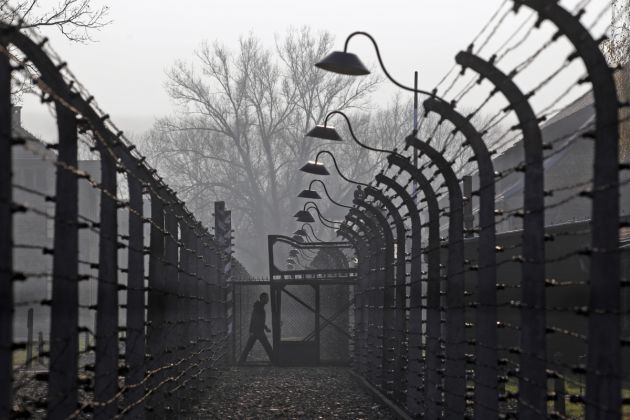World remembers Holocaust in a time of rising hatred

Aging survivors gathered at the former Auschwitz death camp in Poland and political leaders warned that the Nazi genocide must continue to serve as a warning as the world marked International Holocaust Remembrance Day.
On Holocaust Remembrance Day, Jan. 27, signs in Europe and beyond show that ultra-nationalism and extreme right-wing groups are on the rise, The Associated Press reported.
Even Poland, which was occupied and terrorized by Hitler's regime — was convulsed this week by revelations of a fringe neo-Nazi group that honors Hitler.
Other ultranationalist parties that espouse anti-Jewish and anti-Muslim views seem increasingly emboldened as well.
Israel called on Poland on Jan. 27 to amend a bill approved this week by Polish lawmakers that would make it illegal to suggest Poland bore any responsibility for crimes against humanity committed by Nazi Germany on its soil, Reuters reported.
Israeli Prime Minister Benjamin Netanyahu said he instructed his ambassador to meet Polish Prime Minister Mateusz Morawiecki to express opposition to the bill, which would make using phrases like "Polish death camps" punishable by up to three years in prison.
"The law is baseless, I strongly oppose it. One cannot change history and the Holocaust cannot be denied," Netanyahu said, in comments mirrored by other senior Israeli officials.
Poland's Deputy Justice Minister Patryk Jaki, who authored the bill, said on Twitter the law is not directed against Israel.
"Important Israeli politicians and media are attacking us for the bill ... On top of that they claim that Poles are 'co-responsible' for the Holocaust," he said, adding that "this is proof how necessary this bill is."
AUSCHWITZ CONCENTRATION CAMP
It has been more than 70 years since the Nazi-occupied Auschwitz concentration camp was liberated.
Auschwitz was the most notorious of all the concentration camps – where it is believed that more than a million people were systematically exterminated via State systems of execution and torture, The Conversation notes.
Concentration camps were central to the Nazi ideology and victims were mostly Jews, Gypsies, black people, gay people and people with intellectual disabilities.
But while most people have heard of the major concentration camps – Auschwitz, Buchenwald, Dachau, and Treblinka – these were not the only places Jews and other prisoners were held.
Each of the 23 main camps had sub-camps – there were nearly 900 of them in total.
The horrors of Auschwitz and World War II led Western scholars and governments to become increasingly sensitive to the need to educate society about the dangers of exclusionary institutional structures and genocidal social policies.
Which is why schools throughout Europe and beyond teach students about the Holocaust – and the associated moral and ethical issues.
The importance of Holocaust commemoration has also helped to create symbolic places and memorials – such as the Museum of the History of Polish Jews.
This museum has an educational training center with facilities to enrich the studies on the Holocaust. Other sites include the Jewish Museum in Prague and the Museum of Jewish Heritage in New York.
Young people today are growing up at a time when support for right-wing politics is on the rise across Europe.
With unemployment rife and the prospects of owning a home diminishing, right-wing groups offer an alternative way for disengaged young people to see the world.
This is evidenced by a surge of numbers and support for far-right parties groups across Europe – including France, Sweden, The Netherlands and Austria, said The Conversationalist, with referring to the "alt-right" ideas in the United States.
"It is therefore timely and important that young people continue to develop an understanding of the consequences of these ideologies and develop a moral compass.
"One way this can be done is by taking students to these historical sites and memorials to gain a full insight as to what it was like live through horrific events such as the Holocaust," said The Conversationalist.